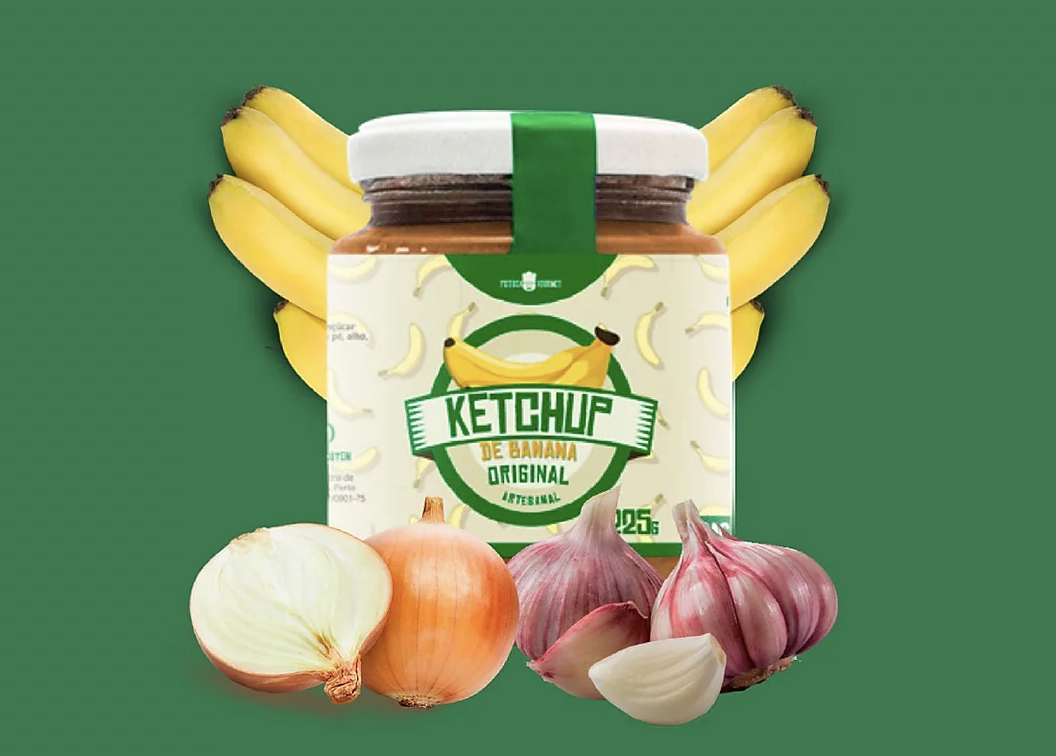Thought For Food (TFF) and Food Lab Accelerator at Google (FLAG) have unveiled a Brazilian banana peel-inspired winner of this year’s TFF x FLAG Circular Economy of Food Prize.
Scooping up the award is Porto Alegre’s Feitosa Foodtech, a startup developing and producing consumer products like ketchup, barbeque sauce, and jam — all from surplus bananas and peels, delivered in reusable glass packaging.
“Banana ketchup is delicious,” said Christine Gould, the founder and CEO of TFF and a contest judge. “Ketchup by its nature needs to be sweet and tart. And that’s what Feitosa has mastered.”
Her team first discovered Feitosa during last year’s summit in Brazil as part of her screening process of 5,200 mostly gen-z and millennial participants from 175 countries, and she noted how a lot of them had ideas related to bananas. (A list of the other top ten finalists can be found here.)
The other judges AFN interviewed were all just as intrigued by the prospect of banana ketchup finding its way onto the world’s dinner tables. “With the food system, what we think to be normal is always changing,” said Douglas Gayeton, co-director of FLAG. “Our tastes are evolving and our desire for something new is evolving, too. We see this collision of cultures leading to a collision of flavors — leading to all sorts of things you would have never imagined…I mean, who would have thought five years ago that we would be eating ice cream made of oats?”
Circular ketchup
A classic precedent for the rapid uptake of things like banana ketchup products, Gayeton added, was the story of arugula, known in English as rocket. Twenty years ago, he recalled, enabling technologies and distribution turned a weed from southern Italy into something globally ubiquitous in three or four years. “Two things happened,” he said. “one, some agronomists found a way to make it more stable and grow it in a farm greenhouse. Two, somebody made a plastic bag so the greens could stay longer. What we think to be ubiquitous or commonplace in many places isn’t and requires many things to make happen.”
Driving down food waste and changing farmer habits were also an important factor for decision making. Speaking to AFN by phone from the deck of a wind-swept ferry bound for the Ellen MacArthur Foundation‘s Isle of Wight head office, Emma Chow, who works there as the foundation’s Food Initiative lead, said this was about shifting farmers onto a greater use of otherwise wasted products, as well as showing a clear commercial rationale for not bombarding banana plantations with pesticides.
“The key here,” she said, “is that if you look at conventional bananas, they’re grown with lots of pesticides. Companies like Feitosa motivate a shift toward agri-ecological farming. There are so many more opportunities like this in our food system.”
As Chow pointed out, Feitosa’s products require organic banana waste, which could mean over-ripe fruits and peels that otherwise get tossed out. Feitosa sources the banana by-products from local producers in Southern Brazil, who they have also trained to incorporate agroforestry-based growing practices that help regenerate farmland. A diverse, multi-skilled team lead the company that includes a chef, designer, farmer, and a nutritionist. They all came together with an aim to design out banana waste, support agroecological growing practices, improve farmer livelihoods, and deliver consumers innovative, tasty and healthy products.
As their prize, Feitosa will now receive fully-funded participation in the 2020 TFF Academy and TFF Summit events in Kuala Lumpur; 3-month incubation by MISTA, the San Francisco-based innovation platform for the food industry; one-on-one mentorship from experts at Danone, Mars, and Givaudan. Initially, the team would have also earned their place at the Google Food Lab Summit, an event hosted in April by Google in California, but that event has since been canceled due to concerns around the ongoing outbreak of Covid-19.
In an interview, Danone’s global director of open innovation and circular economy, Merijn Dols, described how his company was looking for “new ways” to work with startups to foster innovation, and to think about what was in it for Danone was the wrong way to look at it, he said. “The typical transactional mindset is against the spirit of innovation,” he said, citing how his company recognised the need to do more socially and environmentally, noting Danone’s recent commitments to shift towards carbon neutrality. “We can support startups like Feitosa with mentoring, or by giving them access to our products. If we give them early access to our product matrix or our pilot facilities, then we can help them become their best version of themselves very quickly.”
In addition, the FLAG members have selected two additional teams to be recognized as “Special Mentions” in this year’s Circular Economy of Food Challenge:
- Tiger House, a startup in Ghana creates multiple products including a milk drink, biscuits, and a laundry starch spray from tigernuts and their waste by-products. The tigernut is a staple crop with many health and environmental benefits.
- Kua Coffee, a social enterprise in Australia that aims to make “world positive” impacts by sourcing coffee beans directly from growers in Uganda, empowering them to replant trees, and repurposing their coffee grounds as fertilizer and mushroom-growing substrate in local community gardens.
Would you ever dare try banana ketchup? Any other circular economy ideas involving bananas? Let us know by dropping a note to [email protected]





